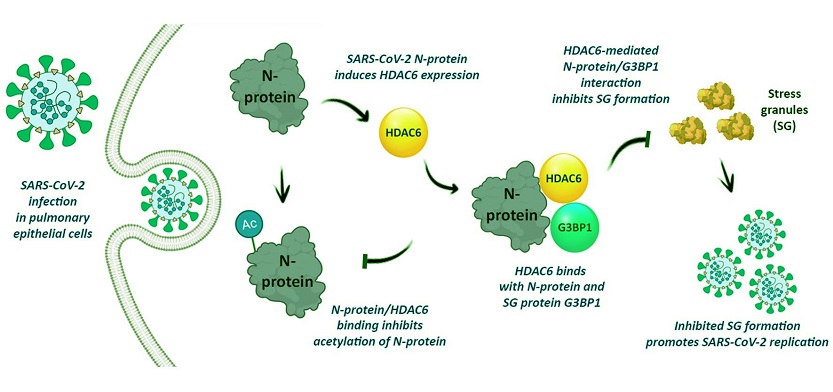Nikhil Prasad Fact checked by:Thailand Medical News Team Aug 14, 2024 8 months, 4 days, 2 hours, 20 minutes ago
COVID-19 News: A New Player in the COVID-19 Puzzle
The COVID-19 pandemic, caused by the SARS-CoV-2 virus, has led to millions of deaths and continues to challenge the world with the emergence of new variants. Researchers globally have been tirelessly working to understand the complex interactions between the virus and the host’s cellular machinery, aiming to discover new therapeutic targets. One recent study conducted by scientists from the Division of Virology at ICMR-National Institute of Cholera and Enteric Diseases, Kolkata, India, has shed light on the role of a specific enzyme, Histone Deacetylase 6 (HDAC6), in facilitating the replication of SARS-CoV-2. This
COVID-19 News report explores the findings of this study and details what it means for our fight against COVID-19.
 Schematic representation showing crosstalk between HDAC6 and SARS-CoV-2 infection. SARS-CoV-2 N protein interacts with and induces the expression of HDAC6. Subsequently, HDAC6 promotes the deacetylation of the N protein, which facilitates its association with G3BP1, leading to the disruption of cellular stress granules
Understanding the Role of HDAC6
Schematic representation showing crosstalk between HDAC6 and SARS-CoV-2 infection. SARS-CoV-2 N protein interacts with and induces the expression of HDAC6. Subsequently, HDAC6 promotes the deacetylation of the N protein, which facilitates its association with G3BP1, leading to the disruption of cellular stress granules
Understanding the Role of HDAC6
HDAC6 is an enzyme known for its ability to remove acetyl groups from proteins, a process that can regulate various cellular functions. Unlike other histone deacetylases that primarily target histones (proteins around which DNA is wrapped), HDAC6 is unique in that it operates in the cytoplasm and interacts with non-histone proteins. This interaction can influence processes such as cell movement, protein degradation, and response to stress.
The study revealed that HDAC6 expression increases in cells infected with SARS-CoV-2, suggesting that the virus may exploit this enzyme to enhance its replication. The researchers identified the viral nucleocapsid (N) protein as the key factor responsible for this upregulation. This finding is significant because it highlights a potential target for therapeutic intervention.
HDAC6: A Double-Edged Sword
Interestingly, the study found that when HDAC6 was downregulated using either specific inhibitors or RNA interference, there was a notable reduction in SARS-CoV-2 replication. This indicates that HDAC6 plays a proviral role, meaning that the virus benefits from the presence of this enzyme. The researchers observed that the deacetylase activity of HDAC6 is crucial for the virus, as it facilitates the interaction between the N protein and a stress granule protein called G3BP1, which is important for viral replication.
The Mechanism Behind HDAC6’s Proviral Role
Further investigation revealed that HDAC6 interacts with the N protein of SARS-CoV-2, promoting the deacetylation of the N protein. This deacetylation is critical for the N protein to associate with G3BP1, a protein that usually helps form stress granules. Stress granules are cellular structures that form in response to stress and help
protect cells by sequestering damaged RNA. However, SARS-CoV-2 appears to hijack this process by using HDAC6 to disrupt stress granule formation, thereby ensuring its RNA is not sequestered and can continue to be used for viral replication.
In cells where HDAC6 was inhibited, the interaction between the N protein and G3BP1 was significantly reduced, leading to a decrease in viral replication. This suggests that targeting HDAC6 could be a viable strategy to disrupt the virus’s replication cycle.
Expanding on the Findings: HDAC6’s Broader Impact
The study’s findings are important not only for understanding how SARS-CoV-2 exploits cellular machinery but also for broader implications in virology. HDAC6 has been implicated in the life cycles of other viruses, including Zika, Ebola, and Influenza A. In the case of SARS-CoV-2, the enzyme’s role in deacetylating the N protein and facilitating its interaction with G3BP1 underscores the enzyme’s importance in viral replication.
Moreover, the fact that HDAC6 inhibitors are currently being explored in clinical trials for cancer and neurodegenerative diseases opens up the possibility of repurposing these inhibitors as antiviral agents. However, more research is needed to determine the safety and efficacy of HDAC6 inhibitors in the context of viral infections, including COVID-19.
Conclusion: A Potential Target for Therapeutic Intervention
This study provides valuable insights into the molecular mechanisms underlying SARS-CoV-2 infection and highlights HDAC6 as a potential target for antiviral drug development. By disrupting the interaction between HDAC6 and the viral N protein, it may be possible to reduce viral replication and spread. However, further research is necessary to explore the full therapeutic potential of targeting HDAC6 in COVID-19.
The study findings were published in the peer-reviewed Virology Journal.
https://virologyj.biomedcentral.com/articles/10.1186/s12985-024-02460-5
For the latest
COVID-19 News, keep on logging to Thailand Medical News.
Read Also:
https://www.thailandmedical.news/news/swiss-study-unveils-sars-cov-2-nsp1-protein-s-role-in-human-mrna-destruction
https://www.thailandmedical.news/news/omicron-variants-show-enhanced-binding-to-human-cells-and-actin
